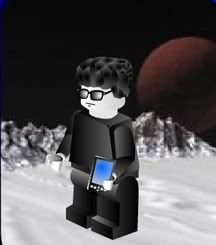Theories of Time Travel
As any reader or viewer of science fiction can tell you, time travel can get pretty messy. But assuming you could figure out a way to time travel, what would it say about the universe and how would it work?
Theory #1: It wouldn’t. No, I don’t mean that time travel is impossible (because, for the purposes of this exercise, we’re assuming it is). What I mean is, the existence of time travel is inherently unstable. Because so many paradoxes can be generated by the existence of time travel (what with people going around and killing their grandfathers as children and all), the only stable universe would be one in which time travel never occurred. Of course, time travel would still be going on in unstable timelines. This might cause time travelers from the unstable timelines to pile up in the stable timelines, of which there would be several if certain theories of quantum physics hold. However, because there are an infinite number of probable outcomes, some of which would include time travel, would the stable timelines eventually fill with time travelers from other timelines? Assuming that the time traveler’s presence in a time line creates an alternate time line which is still stable, it should still be possible for other time travelers to end up in that time line, so long as their presence does not result in more attempts at time travel. So, theoretically, a time line would exist somewhere in which every person who ever traveled back in time and prevented time travel from ever occuring all live in the same timeline.
Theory #2: Everything is predestined. For those of us who like our free will, this is a scary one to ponder. The theory goes that if you traveled back in time, nothing you do will change the timeline because you were always meant to travel back in time. Futurama did a rather crude rendition of this theory when it was revealed that Fry was his own grandfather (after he got the man he thought was his true grandfather killed). Mobius strip, anyone? Robert Heinlein’s The Door Into Summer does a more sophisticated job of demonstrating this theory. When the main character travels through time, events in the future (the year 2000) make perfect sense once the main character goes back to the present (1970ish) and puts events in motion that will obviously lead to the future he had already seen.
Theory #3: One timeline, changes have gradual ripple effect.
This theory suggests that there is still only one timeline, but it can be changed after history has already been written. If you go back in time and change something, the timeline gradually changes accordingly. Any story that has things like “timequakes” fits into this theory. It would kind of imply a second time dimension, one in which the time we perceive changes over time.
Maybe I'll ask the people at the time traveler's convention which theory is best.
Theory #1: It wouldn’t. No, I don’t mean that time travel is impossible (because, for the purposes of this exercise, we’re assuming it is). What I mean is, the existence of time travel is inherently unstable. Because so many paradoxes can be generated by the existence of time travel (what with people going around and killing their grandfathers as children and all), the only stable universe would be one in which time travel never occurred. Of course, time travel would still be going on in unstable timelines. This might cause time travelers from the unstable timelines to pile up in the stable timelines, of which there would be several if certain theories of quantum physics hold. However, because there are an infinite number of probable outcomes, some of which would include time travel, would the stable timelines eventually fill with time travelers from other timelines? Assuming that the time traveler’s presence in a time line creates an alternate time line which is still stable, it should still be possible for other time travelers to end up in that time line, so long as their presence does not result in more attempts at time travel. So, theoretically, a time line would exist somewhere in which every person who ever traveled back in time and prevented time travel from ever occuring all live in the same timeline.
Theory #2: Everything is predestined. For those of us who like our free will, this is a scary one to ponder. The theory goes that if you traveled back in time, nothing you do will change the timeline because you were always meant to travel back in time. Futurama did a rather crude rendition of this theory when it was revealed that Fry was his own grandfather (after he got the man he thought was his true grandfather killed). Mobius strip, anyone? Robert Heinlein’s The Door Into Summer does a more sophisticated job of demonstrating this theory. When the main character travels through time, events in the future (the year 2000) make perfect sense once the main character goes back to the present (1970ish) and puts events in motion that will obviously lead to the future he had already seen.
Theory #3: One timeline, changes have gradual ripple effect.
This theory suggests that there is still only one timeline, but it can be changed after history has already been written. If you go back in time and change something, the timeline gradually changes accordingly. Any story that has things like “timequakes” fits into this theory. It would kind of imply a second time dimension, one in which the time we perceive changes over time.
Maybe I'll ask the people at the time traveler's convention which theory is best.



0 Comments:
Post a Comment
<< Home